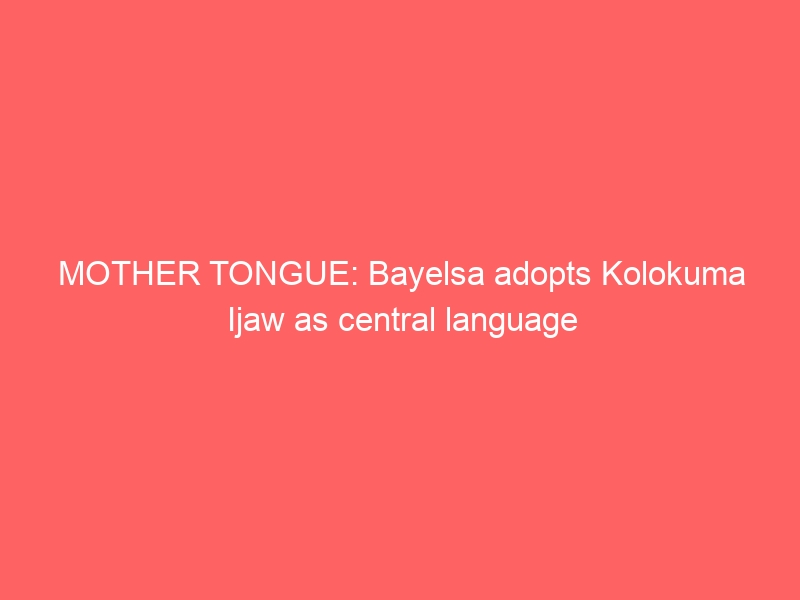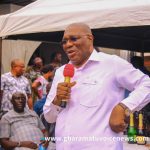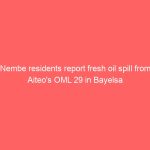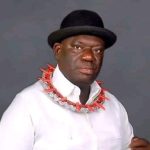MOTHER TONGUE: Bayelsa adopts Kolokuma Ijaw as central language
The importance of mother tongue in Nigeria cannot be over emphasized as it is used as an identity of a people. Like any part of the country or any part of the world, a mothers tongue or local dialect is used to differentiate a person from another. That is the reason why the United Nations Educational, Scientific and Cultural Organisation (UNESCO) deemed it fit to be celebrating mothers tongue every year.
The essence is to make sure that our local languages or dialect didn’t go into extinction while another man’s language will now take over the local languages as its English language that is being spoken in almost all the homes in Nigeria. But unfortunately, children nowadays don’t speak or don’t know how to speak their local languages, especially these 21stcentury children.
That is why it is very important that children are taught their native languages in case you want to pass a message across where a visitor is seated.
However, the reverse is currently the case as many homes now prefer to use the English language to communicate in homes instead of the local languages including yours truly.
ALSO READ: We will turn Niger Delta into another Dubai: Bayelsa state governor
That is why the theme of this year’s mothers tongue celebration using technology for multilingual learning challenges and opportunities is very apt.
However, in Bayelsa State, efforts have been made in the time past and are still being made to make sure that local dialects are spoken in the state as the state according to the commissioner for Ijaw national affairs, Erasmus Patrick, disclosed that the state government has adopted Kolokuma dialect as the general dialect that will be taught in all the primary schools in the state.
Speaking to newsmen recently on the measures the state government was taking to make sure that the state has a uniform local dialect that can be spoken in the state, the commissioner said: “The Ijaw language project is a reality.
“You recall that former Governor Dickson sent a bill to the State House of Assembly which was passed into law in 2008 to make the teaching and learning of the Ijaw language compulsory in all our schools.
“We printed some books that we were giving free of charge to schools. I was part of it at that time.
I’m aware that some schools, private schools in particular in this state, have been teaching the Ijaw language as a compulsory subject.
“But when I came on board, I sent a memo to the State Executive Council to reawaken our consciousness and to refer us to the laws that were passed years back and then praying that the teaching and learning of Ijaw language be made compulsory in all our public schools.
“We have above 500 public schools and the number of teachers that we have is just 200. So in EXCO, we also tried to work and make suggestions that some of our people who are in other ministries who are not so gainfully employed can offer themselves to be trained as Ijaw language teachers.
“These things are being worked on. The Ijaw language shall be made compulsory and be taught in all our schools in the state beginning with JS1.
“So, by the time you get to Primary Two and then you get to secondary school, you will be qualified to write this language in WAEC, by then, it would have been captured in the WAEC syllabus.
“It is Kolokuma language which is the acceptable Ijaw language. It didn’t start now. It has been approved. Even the House of Assembly bill that was passed into law specified Kolokuma as the central Ijaw language.
“That does not mean that other dialects within the area, for instance, the Ogbia, Epei dialects, Nembe will go into extinction. We said whereas the Kolokuma language is the language to be taken in WAEC and will be studied and known by all Ijaw people, these other languages should be taught in schools alongside.
“Everybody has come to accept it now just that there was no will, as it were, to enforce it or to put it into practice but if the government decides like we have done under this Administration and say look it must be enforced, it will work.
“People force us to learn Yoruba when we get to their areas. Our children are subjected to learn Igbo when they go to Igbo land.
“So, why can’t other people learn this language here? It is not a big deal. We have all the materials to get this thing off and I can assure you that it will work. We even proposed as a ministry than to set up Ijaw Learning Centre here,” he said.
Even at this year’s mother tongue celebration venue, the Bayelsa State Government once again advised every parent to try and teach their wards their local dialect at home adding that there is a need for the Ijaw language to be institutionalised in the state. Speaking on behalf of the state government, the commissioner, who was represented by Oyenife Jon Jon, the special adviser to the governor of Bayelsa State on Ijaw national affairs said the importance of the Ijaw language cannot be overemphasized.
He said as a result of that, the Bayelsa State government has agreed to teach Kolokuma dialect as a central language in the state adding that already about two hundred Izon languages have been trained to teach the dialect in all the primary schools in the eight local government. Reading out the address of Patrick Erasmus, Jon Jon read that the government was motivated by the need to preserve the Ijaw language both the central one kolokuma language and other languages as spoken by communities.
He read: “Most of our young children today are unable to com-municate with their mother’s tongue and as United Nations national scientific and cultural organization, UNESCO has repeatedly said that most of the languages will face extinction in a matter of time.
“The Bayelsa State government has thus affected plans to commence the teaching of the Izon language that is the Kolokuma dialect in public and private schools across the state in the current academic session beginning from primary school.
“Some two hundred Izon teachers have been recruited and given the necessary training for the purpose and will be redeployed to primary schools in all the eight local government areas of the state.”
Also speaking, the permanent secretary of the ministry, Ifidi Collins Abiware said that any language that is not spoken slides into extinction adding that language itself is a unifying factor.
He said: “Any language that is not spoken slides into extinction. Language itself is a unifying factor and an identity that unifies one particular ethnic nationality or tribe.
“We have to advise ourselves to speak this dialect which is our identity so that wherever you find yourself, by the time you speak your language, any person that doesn’t understand, you have an advantage over him or her.
“We want to encourage our children even in our homes and our parents, guardians and teachers should speak this local language so that we won’t lose our identity.
“The government of Bayelsa state decided to take Kolokuma dialect because it is the dialect that everybody understands whether you are from Epie, Ijaw, Nembe or Ogbia. “There is this unifying factor in the language, when you speak, all will understand whatever you are saying. No wonder the former President Goodluck Jonathan recently in Yenagoa, said there must be a common language that will be spokes in Bayelsa State.
He said: “If we must come together, there must be one common language we can use to communicate in the state.”
Speaking as a guest speaker during an education summit with a theme optimizing the delivery performance and sustainability of outcomes in the education sector the former president however admonished the Bayelsa State government to make sure that there is a uniform language that will be centrally spoken by all Bayelsans as a means of identity.
According to him, “Language is not only critical in education but also in establishing one’s identity and conscious efforts must be made to ensure our language does not go into extinction.”
Commenting on the need to adopt a common language, Governor Douye Diri of Bayelsa State, revealed that already, the state executive council had adopted Kolokuma as the chosen dialect and had directed the ministries of education and Ijaw national affairs to ensure implementation of the policy. The governor said “Kolokuma Opokuma language will be spoken in Bayelsa State. We have agreed at our exco to adopt Kolokuma Opokuma language for the Ijaws to have an identity. “We will look at gazetting the education policy to become a law. It will be a fifteen years development plan.
We will be reviewing it after three years.” Responding to the introduction of the local language in primary schools, one of the student participants that came for the celebration of mothers tongue, Ebiere Tomkuma, said “Already, we are gradually learning how to speak the Ijaw language in our house.”












